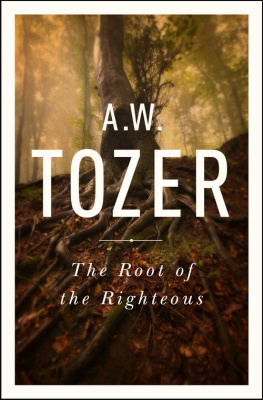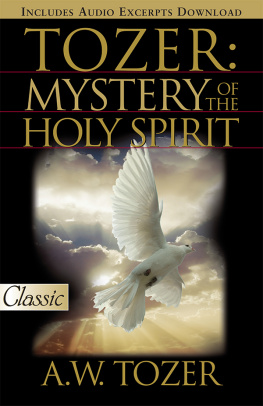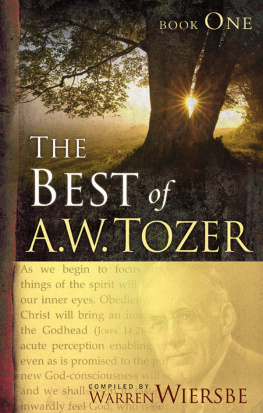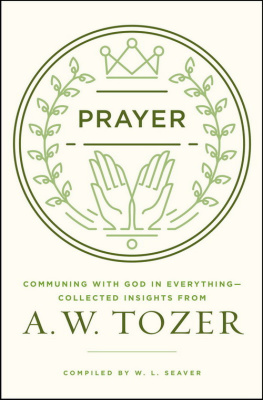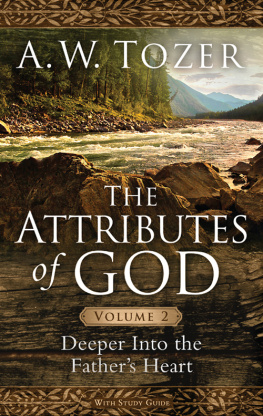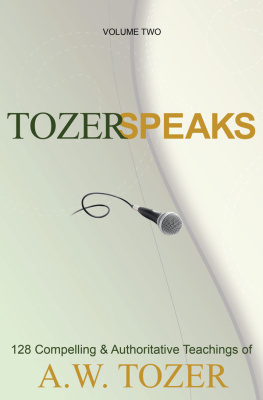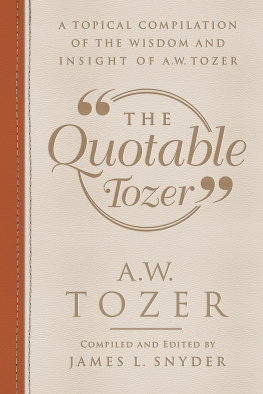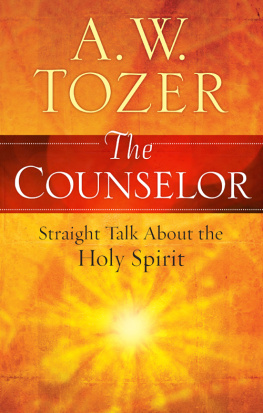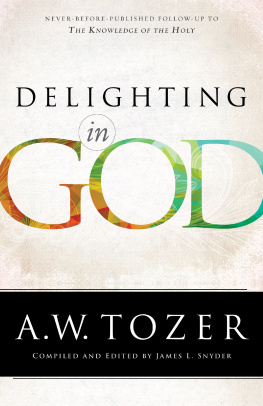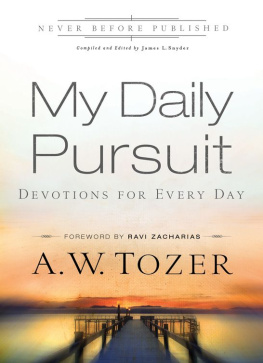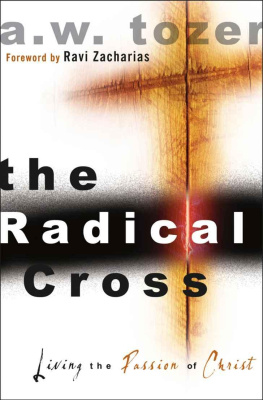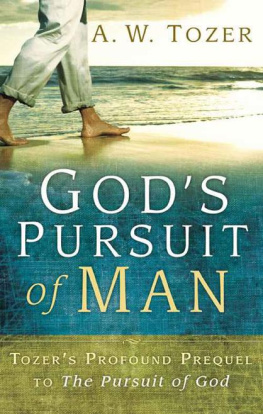The Best of A.W. Tozer
Book Two
Compiled by Warren W. Wiersbe

1980, 2000 by Zur Ltd..
Library of Congress Cataloging-in-Publication Data
Tozer, A. W., 1897-1963
The Best of A. W. Tozer Book Two / A. W. Tozer.
ISBN: 978-1-60066-287-4
Contents
I guess my philosophy is this: Everything is wrong until God sets it right.
That statement from Dr. A. W. Tozer perfectly summarizes what he believed and what he tried to do during his years of ministry. The entire focus of his preaching and writing was on God. He had no time for religious hucksters who were inventing new ways to promote their wares and inflate their statistics. Like Thoreau, whom he read and admired, Tozer marched to a different drummer; and for this reason, he was usually out of step with many of the people in the religious parade.
But it was this evangelical eccentricity that made us love him and appreciate him. He was not afraid to tell us what was wrong. Nor was he hesitant to tell us how God could make it right. If a sermon can be compared to light, then A. W. Tozer released a laser beam from the pulpit, a beam that penetrated your heart, seared your conscience, exposed sin, and left you crying, What must I do to be saved? The answer was always the same: surrender to Christ; get to know God personally; grow to become like Him.
Aiden Wilson Tozer was born in Newburg (then known as La Jose), Pennsylvania, on April 21, 1897. In 1912 the family moved from the farm to Akron, Ohio; and in 1915 he was converted to Christ. He immediately entered into a life of devotional intensity and personal witness. In 1919 he began pastoring the Alliance Church in Nutter Fort, West Virginia. He also pastored churches in Morgantown, West Virginia; Toledo, Ohio; Indianapolis, Indiana; and in 1928 came to the Southside Alliance Church in Chicago. Here he ministered until November, 1959, when he became pastor of the Avenue Road Church in Toronto. A sudden heart attack on May 12, 1963, ended that ministry and Tozer was ushered into Glory.
I am sure that Tozer reached more people through his writing than his preaching. Much of his writing was reflected in the preaching of pastors who fed their souls on his words. In May, 1950, he was named editor of The Alliance Weekly, now The Alliance Witness, which was probably the only religious magazine purchased primarily for its editorials. I once heard Dr. Tozer at an Evangelical Press Association conference taking to task editors who practiced what he called super-market journalismtwo columns of advertising and one aisle of reading material. He was an exacting writer and was as hard on himself as he was on others.
What is there about A. W. Tozers writings that gets hold of us and will not let us go? Tozer did not enjoy the privilege of a university or seminary training, or even a Bible School education for that matter; yet he has left us a shelf of books that will be mined for their spiritual wealth until the Lord returns.
For one thing, A. W. Tozer wrote with conviction. He was not interested in tickling the ears of the shallow Athenian Christians who were looking for some new thing. Tozer redug the old wells and called us back to the old paths, and he passionately believed and practiced the truths that he taught. He once told a friend of mine, I have preached myself off of every Bible Conference platform in the country! The popular crowds do not rush to hear a man whose convictions make them uncomfortable.
Tozer was a mystican evangelical mysticin an age that is pragmatic and materialistic. He still calls us to see that real world of the spiritual that lies beyond the physical world that so ensnares us. He begs us to please God and forget the crowd. He implores us to worship God that we might become more like Him. How desperately we need that message today!
A. W. Tozer had the gift of taking a spiritual truth and holding it up to the light so that, like a diamond, every facet was seen and admired. He was not lost in homiletical swamps; the wind of the Spirit blew and dead bones came to life. His essays are like fine cameos whose value is not determined by their size. His preaching was characterized by an intensityspiritual intensitythat penetrated ones heart and helped him to see God. Happy is the Christian who has a Tozer book handy when his soul is parched and he feels God is far away.
This leads to what I think is the greatest contribution A. W. Tozer makes in his writings: he so excites you about truth that you forget Tozer and reach for your Bible. He himself often said that the best book is the one that makes you want to put it down and think for yourself. Rarely do I read Tozer without reaching for my notebook to jot down some truth that later can be developed into a message. Tozer is like a prism that gathers the light and then reveals its beauty.
Warren W. Wiersbe
The Moody Church
Chicago, Illinois
The Immutability of God
O Christ our Lord, Thou hast been our dwelling place in all generations. As conies to their rock, so have we run to Thee for safety; as birds from their wanderings, so have we flown to Thee for peace. Chance and change are busy in our little world of nature and men, but in Thee we find no variableness nor shadow of turning. We rest in Thee without fear or doubt and face our tomorrows without anxiety. Amen.
The immutability of God is among those attributes less difficult to understand, but to grasp it we must discipline ourselves to sort out the usual thoughts with which we think of created things from the rarer ones that arise when we try to lay hold of whatever may be comprehended of God.
To say that God is immutable is to say that He never differs from Himself. The concept of a growing or developing God is not found in the Scriptures. It seems to me impossible to think of God as varying from Himself in any way. Here is why:
For a moral being to change it would be necessary that the change be in one of three directions. He must go from better to worse or from worse to better; or, granted that the moral quality remain stable, he must change within himself, as from immature to mature or from one order of being to another. It should be clear that God can move in none of these directions. His perfections forever rule out any such possibility.
God cannot change for the better. Since He is perfectly holy, He has never been less holy than He is now and can never be holier than He is and has always been. Neither can God change for the worse. Any deterioration within the unspeakably holy nature of God is impossible. Indeed I believe it impossible even to think of such a thing, for the moment we attempt to do so, the object about which we are thinking is no longer God but something else and someone less than He. The one of whom we are thinking may be a great and awesome creature, but because he is a creature he cannot be the self-existent Creator.
As there can be no mutation in the moral character of God, so there can be none within the divine essence. The being of God is unique in the only proper meaning of that word; that is, His being is other than and different from all other beings. We have seen how God differs from His creatures in being self-existent, self-sufficient, and eternal. By virtue of these attributes God is God and not some other being. One who can suffer any slightest degree of change is neither self-existent, self-sufficient, nor eternal, and so is not God.
Only a being composed of parts may change, for change is basically a shift in the relation of the parts of a whole or the admission of some foreign element into the original composition. Since God is self-existent, He is not composed. There are in Him no parts to be altered. And since He is self-sufficient, nothing can enter His being from without.


